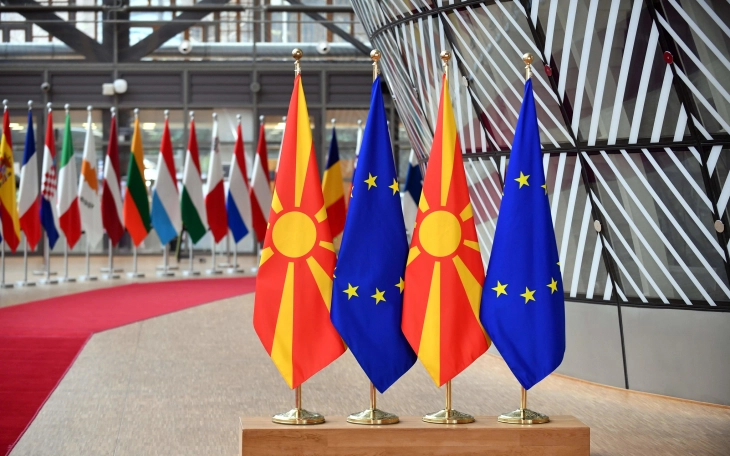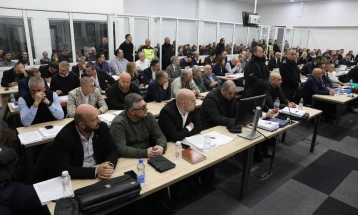North Macedonia has opened EU negotiations, process might not resume due to constitutional changes
- Last year, North Macedonia after being in the EU’s waiting room for 17 years, officially opened the process of negotiations with the Union by holding the first intergovernmental conference. T

Skopje, 2 January 2023 (MIA) – Last year, North Macedonia after being in the EU’s waiting room for 17 years, officially opened the process of negotiations with the Union by holding the first intergovernmental conference. The explanatory and bilateral screenings to align with the European legislation are under way with this process expected to be concluded in November 2023. However, in order the country’s European path to resume, constitutional changes should be introduced by including the Bulgarians into the Constitution. Over this matter, the government and the opposition have radically different positions. Yet, the government predicts that the country could join the EU by 2030. It is deemed that 2023 will be a crucial year for the country to resume its EU integration process.
After approving the so called “French proposal”, North Macedonia on July 17, 2022, having been a candidate for EU membership for 17 years, held the first intergovernmental conference with the Union, thus officially opening the EU accession process.
The condition for resuming the EU integration process and the holding of the second intergovernmental conference, which also opens the first negotiating Cluster – the constitutional changes – is included in the Bilateral Protocol, signed by North Macedonia’s Foreign Minister Bujar Osmani and now the former Bulgarian foreign minister Ekaterina Zaharieva on July 19, 2022. The draft-conclusions of the French EU presidency noted that the Protocol is an integral part of the negotiating framework for North Macedonia and that the EU will follow the progress made involving the document.
Before negotiations are formally opened, the process of screening the national legislation should be concluded first.
A two-third majority, required to change the Constitution, is yet to be secured in the Macedonian Parliament as some parties have started conditioning their support for constitutional changes with early elections. Prime Minister Dimitar Kovachevski has repeatedly called on all 120 MPs to demonstrate responsibility before present and future generations and support North Macedonia’s accession to the EU by leaving any partisan interests aside, underlying: “The citizens want to be part of the EU and the future of the citizens is an obligation equally of all political parties in Parliament.”
After the government approved the “French proposal” for the start of accession negotiations in July 2022, the largest opposition party VMRO-DPMNE said it wouldn’t endorse the opening of the Constitution for the purpose of including the Bulgarian community in it. After the proposal was passed in Parliament, opposition leader Hristijan Mickoski showed notarized statements by all members of the VMRO-DPMNE parliamentary group pledging they won’t support constitutional changes.
In September, the opposition demanded holding of a referendum to annul the Friendship Treaty with Bulgaria, which was later rejected by Parliament Speaker Talat Xhaferi as being unconstitutional. The party Levica also followed suit demanding a referendum. The initiative was also rejected by the Speaker.
In October, some ten days after the European Commission had released the progress report on North Macedonia, the VMRO-DPMNE leader said his party wouldn’t support the opening of the Constitution as long as the European Union provided guarantees that the country would join the bloc and that it wouldn’t be again subjected to a veto from Bulgaria.
“When someone from Brussels will give a clear guarantee to the Macedonian people and to the citizens of Macedonia, then we can sit down and talk. Until then, the Preamble won’t be changed and the Constitution won’t be opened,” Mickoski has stated.
Some parties from the Albanian political bloc have started conditioning the constitutional changes with the removal of the “20 percent” provision in the Constitution, demanding that Albanian is given an equal status as the Macedonian language.
MIA spoke to political analyst Marko Troshanovski, president of the Institute for Democracy “Societas Civilis – Skopje”, about the EU integration process last year and what the country can expect this year regarding the process.
According to Troshanovski, last year was perhaps a culmination of the frustrations this country had gone through in the EU accession process in the past 15 years and as such, it had polarized the society with the public perception of the EU’s credibility dropping, although support remains high according to recent opinion polls.
“Analyzing deeper the results, it can be pointed out that people are starting to believe that reforms are not crucial to make progress in the process, meaning they will stop pushing the political elites to deliver vital reforms,” he said.
He mentioned that the inclusion of the bilateral issues with Bulgaria in the Negotiating Framework is a fact, which may further problematize the EU accession process.
“The process won’t be easy anyhow and will come across a resistance from the society, which was the case in all member countries before joining the EU – EU’s ratings had dropped during the negotiations, because some of these reforms had been painful. In our case, the issues are very emotional, sensitive and identity-related. Unless our Euro-Atlantic partners manage to pull them aside at the sidelines so as not to condition the process, then there is a chance this process to become more positive for the country. Otherwise, it could turn into a formal alignment of the negotiating positions and the legislation, however, it would be alien to the people and the society wouldn’t feel it as being its own, which is one of the main goals to accession the EU,” said Troshanovski.
As regards what the country would expect from the integration process in 2023, the political analyst pointed out the completion of the screening, a report on the explanatory screening and a EU report on the country’s efforts in the field.
“However, the resumption of the negotiations and the second intergovernmental conference are conditioned by the inclusion of the Bulgarians in the Constitution. It is fair to say we’d opened the negotiations, but we might not resume the process unless they were included,” he stressed.
As a state and as a society, Troshanovski noted, we have until November to make it happen, otherwise there is a chance of decoupling the country and Albania and of again entering a waiting phase, of uncertainty.
“This is what the country needs the least amid a crisis lingering for several year, including a crisis in governance and rule of law at home, the economic, health and war crisis,” Troshanovski told MIA.
Asked whether the country could be hit by additional blockades from Sofia, the analyst said the probability of that throughout the negotiating process is great and significant.
“No one can guarantee that there won’t be any more blockades despite guarantees being demanded by the opposition and by part of the society. Now, it is up to EU’s soft power to prevent the negotiation process to be diminished through unnecessary issues regarding the identity and history,” stated Troshanovski.
According to him, given the political crisis in Bulgaria, it can be expected from the parties to continue scoring political points on the matter for a long time and that even blockades could be possible mainly for scoring political points at home all in line with Bulgaria’s strategic standing against the Macedonian issue.
Holding an end-of-the-year press briefing in December, Foreign Minister Bujar Osmani said the documents that had been signed and the framework provide no foundation for Bulgaria to impose new blockades in the event the Constitution is amended. Other member countries, not only Sofia, can block the country only if they wanted to since EU is reaching decisions with a consensus, he has stated. A relationship is being built with Bulgaria so as to leave no room in the future for new blockades, according to Osmani.
He also insisted that the constitutional changes would be passed this year, stressing there is nothing controversial in including the Bulgarians, Montenegrins and Croats in the Constitution. Osmani noted that talks on securing two-third majority in Parliament, required to approve the opening of the Constitution, will intensify as of early January.
Neda Dimova Prokikj
Translated by Bisera Altiparmakova







